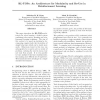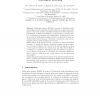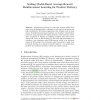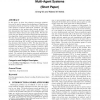64 search results - page 10 / 13 » Reducing the complexity of multiagent reinforcement learning |
ICML
1998
IEEE
14 years 8 months ago
1998
IEEE
This paper introduces the RL-TOPs architecture for robot learning, a hybrid system combining teleo-reactive planning and reinforcement learning techniques. The aim of this system ...
AGI
2011
12 years 11 months ago
2011
We present an actor-critic scheme for reinforcement learning in complex domains. The main contribution is to show that planning and I/O dynamics can be separated such that an intra...
LAMAS
2005
Springer
14 years 1 months ago
2005
Springer
Abstract Multi-agent systems (MASs) is an area of distributed artificial intelligence that emphasizes the joint behaviors of agents with some degree of autonomy and the complexiti...
ECML
2006
Springer
13 years 11 months ago
2006
Springer
Reinforcement learning in real-world domains suffers from three curses of dimensionality: explosions in state and action spaces, and high stochasticity. We present approaches that ...
ATAL
2008
Springer
13 years 9 months ago
2008
Springer
In this paper, we show how adaptive prototype optimization can be used to improve the performance of function approximation based on Kanerva Coding when solving largescale instanc...




